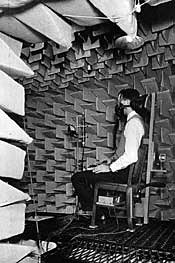Editor's note: Last October, Leo Beranek, S.D. '40, AMP '65, received the National Medal of Science for engineering from President George W. Bush. In large part the award honored the acoustic research that Beranek began as a graduate student and continued in the University's first-ever research project under government contract one of Harvard's scientific contributions to the Allied military effort in World War II. Beranek writes:
I think that my pioneering project was indeed a learning experience for Harvard.
When the National Defense Research Committee (NDRC) asked me to form the Electro-Acoustic Laboratory (the project was initially called Research on Sound in Combat Vehicles), in October 1940, I went to John W. Lowes, the financial vice president at Harvard. He rocked back and forth for a minute in his chair, and then said that he believed we should not write anything down. He said that he would set up an account in the bursar's office called "Anonymous Research under Leo Beranek" and the project should keep a simple ledger: on one side, income from billings to the government, and on the other side outgoing payments. I simply sent over a voucher to the bursar's office for salaries, laboratory facilities, travel, et cetera and Harvard paid the bills. For income, I billed the government on the forms it provided.
| ||||||
After about two years, when our laboratory had about a hundred employees spread about in the Cruft and Jefferson Physical Laboratories, Harvard's treasurer, William H. Claflin, discovered the "Anonymous" account and found that the bursar's office knew nothing about the project, had never contacted me, and had no thoughts on financial control. At that point, the project was given an official name, the bursar's office started keeping records, and my activities were audited.
Once the war was over, the government in turn sent auditors to determine whether the laboratory was properly run. The bursar's office sent them to me because it had no records for the first two years. When I brought out the simple ledger (several books after two years), they burst into laughter. They took the books away with them and about six months later mailed them back with no comment. So Lowes had been right!
It was certainly a simpler era. The faculty at the Cruft Laboratory, for example, had only one telephone. When a call came in for a professor or researcher, a telegraphic code was sent out by the laboratory's sole secretary (we had a little loudspeaker in each room) to summon the proper person to her office. My code was dit dah dit dit (the Morse code for L). When my war project was getting started, I said to Professor F.V. Hunt, my mentor, "Now I must have a telephone in my office, because this project is a big thing, and there will be hiring, et cetera." His immediate answer was, "Now, Leo, take it easy. Don't hurry." I did not take his advice, because the Army Air Force had announced that this was a very high priority project that needed immediate attention. I hired staff and set up the necessary laboratory equipment as fast as I could, and we overcame the communication problems of high-altitude flying in record time.







